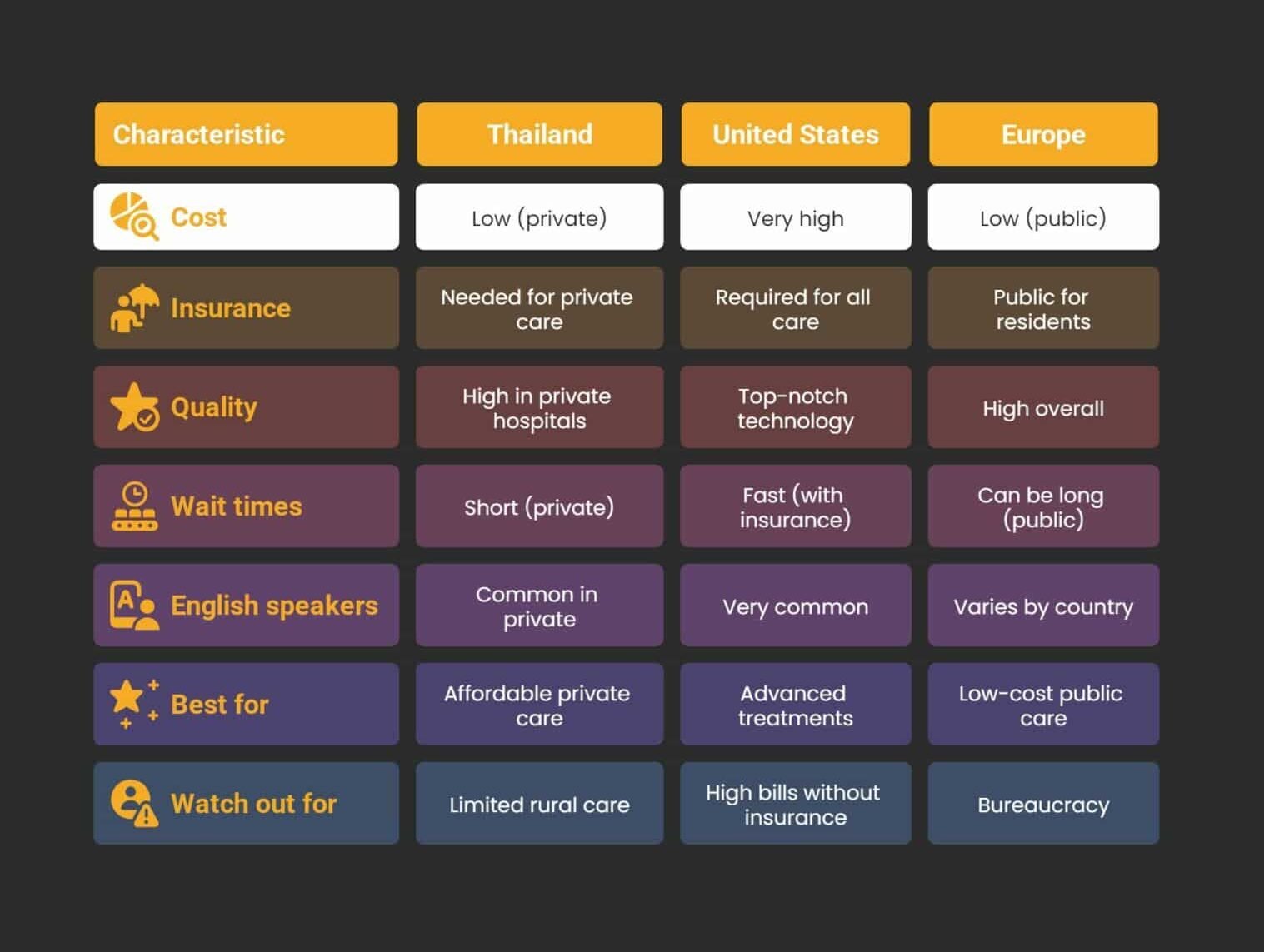How Thailand’s healthcare system compares to the U.S. and Europe for expats
The differences between all of these areas and which one works the best for you

If you’re moving abroad, healthcare is one of the most important things to think about. Many expats choose Thailand because it offers good medical care at a lower cost than in the US or Europe. Private hospitals in Thailand are modern and affordable and have English-speaking doctors, making them a popular choice. In this article, we look at how Thailand’s healthcare system compares to the US and Europe, so you can see the differences in quality, price, and access, and choose what works best for you.
On this page
| Jump to Section | Description |
|---|---|
| Healthcare in Thailand for expats: public vs private systems | Explains the differences between Thailand’s public and private healthcare systems and their suitability for expats. |
| Healthcare in the US: Advanced but expensive | Highlights the advanced but costly US healthcare system, emphasising the importance of insurance for expats. |
| Healthcare in Europe: Public systems with strong support | Discusses European public healthcare systems, their affordability, and what expats need to know about access and delays. |
| What expats should know about healthcare in Thailand | Gives expats key insights about healthcare in Thailand, focusing on health insurance and emergency services. |
Healthcare in Thailand for expats: Public vs private systems

If you’re moving to Thailand, it’s important to understand how the healthcare system works. Thailand has both public and private hospitals, and knowing the difference can help you make better choices and avoid stress.
Public healthcare
Thailand’s public healthcare is mainly for Thai citizens. Most locals get low-cost care through government programs. For example, a doctor’s visit can cost just 30 baht (about US$1).
Some expats working for Thai companies can use public hospitals through the Social Security system. But public hospitals are often crowded, and waiting times can be long. English-speaking doctors or nurses are not common, especially outside big cities. Thai citizens are given priority, so expats may face delays or extra costs.
Private healthcare
Private hospitals in Thailand are a popular choice for expats. Many of them meet international standards and are known for excellent service. Hospitals like Bangkok Hospital has English-speaking staff and modern equipment.
Prices are much lower than in the US or Europe. A check-up may cost US$50 to US$100. Bigger treatments like surgery are also cheaper. For example, an MRI scan in Thailand costs around US$300, while in the US it could be over US$1,500.
Pros and cons
Why private hospitals are a good choice:
- Affordable: Good care at much lower prices
- Fast service: Short wait times, even for non-urgent visits
- Trusted quality: Many hospitals are certified to global standards.
Things to consider:
- Can get expensive: Without insurance, regular visits can cost a lot.
- Fewer options in rural areas: Top hospitals are mostly in big cities.
- Public hospitals may not be ideal for expats: Long waits and language issues
What expats should do?
Most expats choose private health insurance to make sure they can use the best hospitals without high bills. Providers like Cigna offer plans that cover private hospitals in Thailand and medical care abroad, so you’re protected no matter where you are.
Thailand’s public healthcare works well for locals, but if you’re an expat, private healthcare is often the better choice. It gives you fast, reliable, and high-quality care, and that’s a big reason why many expats feel safe and comfortable living in Thailand.
Healthcare in the US: Advanced but expensive

The US has one of the most advanced healthcare systems in the world, but it also comes with high costs and can be difficult to understand. For expats, it’s important to know how the system works before needing care.
How the system works
The US does not provide free or universal healthcare. Most people use private insurance, usually through their jobs. There are also government programs that help specific groups:
- Medicare: For people aged 65 and older or those with disabilities
- Medicaid: For low-income individuals, depending on the state
- Veterans’ healthcare: For military veterans
- ACA (Affordable Care Act): Helps more people get insurance through public marketplaces.
Still, private insurance remains the main way to access healthcare in the US.
Benefits of the US healthcare
- High-quality care: Access to experienced doctors and advanced treatments
- Modern technology: Some of the latest medical tools and procedures are available.
- Preventive care: Regular check-ups and screenings help catch health problems early.
Problems with the US healthcare
- Very high costs: Without insurance, a hospital stay can cost tens of thousands of US dollars.
- No free coverage for expats: Government programmes usually don’t include non-residents.
- Complicated process: Bills, insurance rules, and provider networks can be hard to follow.
What expats need to know
- Insurance is essential: Without coverage, even basic care can be very expensive. Plans like Cigna Global help cover both local and international medical needs.
- Location matters: Urban areas have more hospitals and specialists. Rural areas may have limited access.
- Telehealth is useful: Online doctor visits are more common now but not always enough for serious health issues.
Healthcare in the US is advanced, but it’s also costly and complex. For expats, having good insurance is the best way to get quality care and avoid high medical bills.
Healthcare in Europe: Public systems with strong support

Most countries in Europe offer universal healthcare. This means people can get medical treatment without worrying about high costs. Each country has its own system, but the main idea is the same: healthcare should be available to everyone.
How the system works
European countries use different models to run their healthcare systems, but all aim to give good, low-cost care to all residents:
- Tax-funded systems: The government pays for healthcare using taxes.
- Insurance-based systems: Workers and employers pay into insurance funds that cover medical costs.
- Mixed systems: A combination of public insurance and private care providers.
No matter the model, most residents get full or nearly full coverage for doctor visits, hospital care, and medicines.
Benefits of European healthcare
- Good quality care: Well-trained doctors and modern hospitals
- Low cost for patients: Many services are free or have small fees.
- Fair access: People get care based on need, not income.
Challenges for expats
- Longer wait times: For non-urgent care, you may have to wait weeks or months.
- More paperwork: Public systems often have forms and steps to follow.
- Residency rules: Expats must often prove legal residency or buy private insurance before using public healthcare.
Europe’s healthcare systems offer reliable, low-cost care to most people. But for expats, it’s important to check what coverage you qualify for. If you’re new to the country or staying short-term, private health insurance is often needed. With proper planning, you can enjoy the strong support these systems provide without facing delays or extra costs.
Key comparison table

What expats should know about healthcare in Thailand

If you’re moving to Thailand, it’s important to plan ahead for healthcare. Here are the key things to keep in mind for healthcare in Thailand for expats:
Visa and health insurance: Many long-term visas, like retirement visas, require health insurance. If you don’t have the right insurance, your visa might be denied or not renewed.
Private insurance is important: Most expats can’t use Thailand’s public healthcare unless they work for a Thai company and pay into the system. That’s why private health insurance is a must. It gives you access to private hospitals, which are faster, more modern, and have English-speaking doctors. Without insurance, you’ll need to pay out of pocket, which can be very expensive, especially for emergencies or major treatments.
Live near a good hospital: Try to live near a trusted private hospital, especially in cities like Bangkok or Chiang Mai. These hospitals offer better service and are more used to helping expats.
Know where to go in an emergency: Make sure you know which hospital near you has 24/7 emergency care. Private hospitals usually provide quick and reliable emergency services, but they can be costly without insurance.
Many expats choose health plans from Cigna, which are made for people living abroad. These plans cover check-ups, hospital visits, and emergencies—both in Thailand and in other countries—so you can feel safe wherever you are.
Healthcare works differently in each country, and it’s important for expats to understand what to expect. Thailand is known for its affordable and good-quality private hospitals, but you’ll need insurance to access them easily. The US has some of the best medical care in the world, but it’s very expensive and hard to use without proper insurance.
In Europe, most people get public healthcare at a low cost, but expats may need to wait longer or show proof of residency. If you’re living in Thailand, having private health insurance helps you get fast and reliable care while also meeting visa rules. To save more on your medical bills, you can read our guide on how to reduce out-of-pocket medical expenses.
Latest Thailand News
Follow The Thaiger on Google News:


























